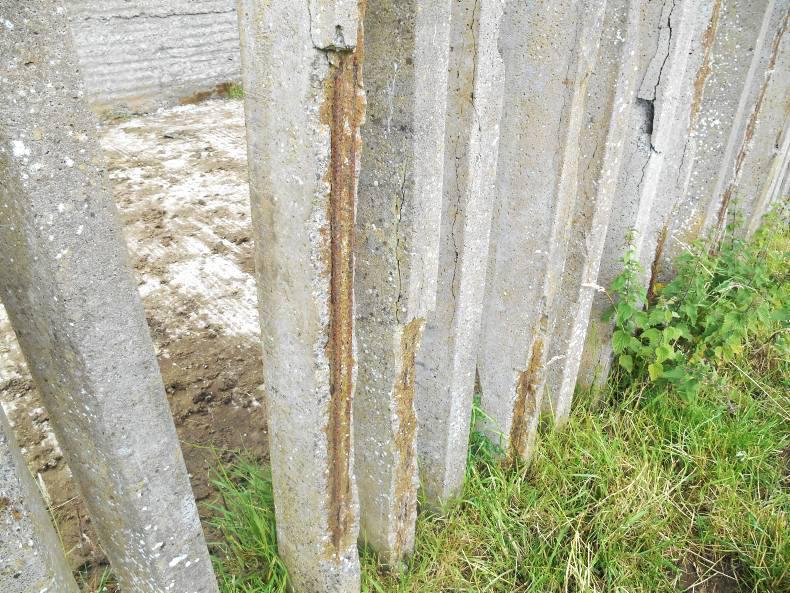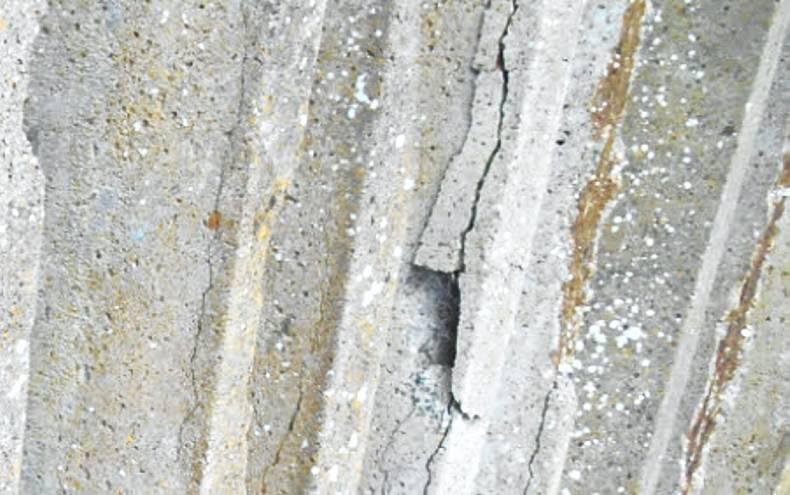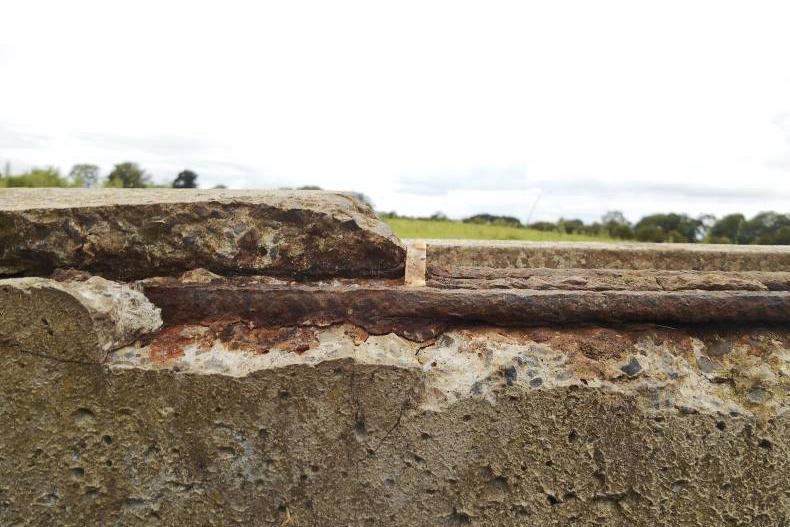As most people with older sheds are now finding out, cattle slats are not lifetime items and will need replacing at some point.
Slatted sheds became popular in Ireland from the 1970s onwards and the slats in those sheds were only designed to last 20 years, with some not even reaching this age due to poor manufacture or installation. People with slatted sheds over 12 years old should check their slats to ensure they are in good order. Failure of slats or manhole covers can be an expensive way to discover that replacement is required. Failure can and has resulted in the loss of highly valuable livestock and even human life as people try to save animals that have fallen into slurry tanks.

Picture 1
After slats came into use decades ago, it was realised that steel was placed too near the outer surface of the concrete and was at risk of corrosion, leaving the slat at risk of collapse. Corrosion, or damage during installation, can allow slurry to come in contact with the steel. The steel eventually rusts, weakens and swells, cracking the concrete. As a result of this, a recommendation came in for a minimum cover of concrete over the steel. The cover required is 35mm. Slats should be inspected annually for signs of corrosion and be replaced where necessary.


Pictures 2 and 3
How to inspect slats:
Thoroughly clean the slatted floor, including any external manhole covers, and examine the entire floor for sagging, cracking, rust stains and spalling of concrete, ie breaking of layers or pieces of concrete from the surface.For single slats, suspect slats should be lifted, power-washed and examined for cracks. Take care when doing this work, otherwise someone might fall into the tank or some slats could end up in the tank.The telltale signs that slats are in a dangerous condition are significant cracks lengthways and crossways on the side and underside (see picture 3). There may also be evidence of rust stains coming from cracks or spalling of the concrete in advanced cases of deterioration.Generally, gang slats would be expected to perform well for at least 15 years without you having to worry too much about checking them. However, there is always the possibility that one slat may be suspect for some unknown reason, so an odd check for sagging or a crack, even with relatively new slats, is a reasonable precaution. 
Picture 4
When chunks of concrete start appearing in the field after slurry spreading, slats need to be checked. If the slat in picture 4 was left in the shed, lumps of concrete would eventually fall into the tank.Replacing slats and
CE mark
If you decide slats need to be replaced, you may be entitled to a grant as part of TAMS II. According to the Department of Agriculture, if applying for grant aid for replacing slats, any existing internal agitation points within a building have to be removed as part of the slat replacement works. Also, the Department says that upon completion of the slat replacement works, all tanks have to have facilities for the full agitation of slurry from point(s) outside the building or have a simple aeration system installed. It should be noted that any items that are pre-cast, such as slats, beams or suspended passages, concrete blocks etc, need a CE mark to be grant-compliant. Slat manufacturers that are on the accepted concrete slat list EN12737 are listed on this page. New slats cost about €45 per square metre and are built to have a 25-year life span. When replacing slats you should ensure:
The tank is fully empty before any work starts.The measurements of the new slats correspond with the old ones.The seating and surrounding concrete is cleaned and there are no foreign objects that may leave the new slats unbalanced.That no one enters the tank during slat replacement.Slats should have a full bearing of at least 150mm at points of support.
?Slat manufacturers on accepted concrete slat list EN12737
Concrete Manufacturing Co. Ltd,
Ballygaddy Road,
Tuam,
Co Galway
Banagher Precast Concrete Ltd,
Queen St.,
Banagher,
Co Offaly
Booth Precast Products Ltd.,
Ballymullen,
Abbeyleix,
Co Laois
Corbett Concrete
Products Ltd,
Mooneraha,
Cahir,
Co Tipperary
Croom Concrete Ltd,
Off Church Road,
Croom,
Co Limerick.
Drumderry Precast,
Drumderry,
Bunclody,
Co Wexford.
Fogarty Concrete Ltd,
(Campion Slats)
Carrowreagh,
Kilcotton,
Borris-in-Ossory,
Co. Laois
Hanlon Concrete Products Ltd,
Lowtown,
Robertstown,
Naas,
Co Kildare
Liam Armstrong Concrete Products Ltd,
Garracloon,
Cloghans,
Ballina,
Co. Mayo
Longford Precast &
Prestressed Concrete Products Ltd,
Cloonaugh,
Drumlish,
Co. Longford
McGrath Precast Concrete Ltd.,
O’Callaghan Mills,
Co Clare
Oran Pre-cast Ltd.,
Deerpark Industrial Estate,
Oranmore,
Co Galway
W & M Kiely Ltd,
Courtbrack,
Blarney,
Co Cork
William Maxwell
Precast Ltd,
Empor,
Ballynacargy,
Co Westmeath
Wright Quarry Products Ltd,
Rockcorry,
Swann’s Cross
Co Monaghan
Wright Concrete Products Ltd,
Aclint Bridge,
Carrickmacross,
Co Monaghan
Hughes Precast Products Ltd,
338 Monaghan Road,
Middletown,
Co Armagh
BT60 4JQ
This list is updated regularly. See the Department of Agriculture website for the latest update and more details on the accepted slat list.
As most people with older sheds are now finding out, cattle slats are not lifetime items and will need replacing at some point.
Slatted sheds became popular in Ireland from the 1970s onwards and the slats in those sheds were only designed to last 20 years, with some not even reaching this age due to poor manufacture or installation. People with slatted sheds over 12 years old should check their slats to ensure they are in good order. Failure of slats or manhole covers can be an expensive way to discover that replacement is required. Failure can and has resulted in the loss of highly valuable livestock and even human life as people try to save animals that have fallen into slurry tanks.

Picture 1
After slats came into use decades ago, it was realised that steel was placed too near the outer surface of the concrete and was at risk of corrosion, leaving the slat at risk of collapse. Corrosion, or damage during installation, can allow slurry to come in contact with the steel. The steel eventually rusts, weakens and swells, cracking the concrete. As a result of this, a recommendation came in for a minimum cover of concrete over the steel. The cover required is 35mm. Slats should be inspected annually for signs of corrosion and be replaced where necessary.


Pictures 2 and 3
How to inspect slats:
Thoroughly clean the slatted floor, including any external manhole covers, and examine the entire floor for sagging, cracking, rust stains and spalling of concrete, ie breaking of layers or pieces of concrete from the surface.For single slats, suspect slats should be lifted, power-washed and examined for cracks. Take care when doing this work, otherwise someone might fall into the tank or some slats could end up in the tank.The telltale signs that slats are in a dangerous condition are significant cracks lengthways and crossways on the side and underside (see picture 3). There may also be evidence of rust stains coming from cracks or spalling of the concrete in advanced cases of deterioration.Generally, gang slats would be expected to perform well for at least 15 years without you having to worry too much about checking them. However, there is always the possibility that one slat may be suspect for some unknown reason, so an odd check for sagging or a crack, even with relatively new slats, is a reasonable precaution. 
Picture 4
When chunks of concrete start appearing in the field after slurry spreading, slats need to be checked. If the slat in picture 4 was left in the shed, lumps of concrete would eventually fall into the tank.Replacing slats and
CE mark
If you decide slats need to be replaced, you may be entitled to a grant as part of TAMS II. According to the Department of Agriculture, if applying for grant aid for replacing slats, any existing internal agitation points within a building have to be removed as part of the slat replacement works. Also, the Department says that upon completion of the slat replacement works, all tanks have to have facilities for the full agitation of slurry from point(s) outside the building or have a simple aeration system installed. It should be noted that any items that are pre-cast, such as slats, beams or suspended passages, concrete blocks etc, need a CE mark to be grant-compliant. Slat manufacturers that are on the accepted concrete slat list EN12737 are listed on this page. New slats cost about €45 per square metre and are built to have a 25-year life span. When replacing slats you should ensure:
The tank is fully empty before any work starts.The measurements of the new slats correspond with the old ones.The seating and surrounding concrete is cleaned and there are no foreign objects that may leave the new slats unbalanced.That no one enters the tank during slat replacement.Slats should have a full bearing of at least 150mm at points of support.
?Slat manufacturers on accepted concrete slat list EN12737
Concrete Manufacturing Co. Ltd,
Ballygaddy Road,
Tuam,
Co Galway
Banagher Precast Concrete Ltd,
Queen St.,
Banagher,
Co Offaly
Booth Precast Products Ltd.,
Ballymullen,
Abbeyleix,
Co Laois
Corbett Concrete
Products Ltd,
Mooneraha,
Cahir,
Co Tipperary
Croom Concrete Ltd,
Off Church Road,
Croom,
Co Limerick.
Drumderry Precast,
Drumderry,
Bunclody,
Co Wexford.
Fogarty Concrete Ltd,
(Campion Slats)
Carrowreagh,
Kilcotton,
Borris-in-Ossory,
Co. Laois
Hanlon Concrete Products Ltd,
Lowtown,
Robertstown,
Naas,
Co Kildare
Liam Armstrong Concrete Products Ltd,
Garracloon,
Cloghans,
Ballina,
Co. Mayo
Longford Precast &
Prestressed Concrete Products Ltd,
Cloonaugh,
Drumlish,
Co. Longford
McGrath Precast Concrete Ltd.,
O’Callaghan Mills,
Co Clare
Oran Pre-cast Ltd.,
Deerpark Industrial Estate,
Oranmore,
Co Galway
W & M Kiely Ltd,
Courtbrack,
Blarney,
Co Cork
William Maxwell
Precast Ltd,
Empor,
Ballynacargy,
Co Westmeath
Wright Quarry Products Ltd,
Rockcorry,
Swann’s Cross
Co Monaghan
Wright Concrete Products Ltd,
Aclint Bridge,
Carrickmacross,
Co Monaghan
Hughes Precast Products Ltd,
338 Monaghan Road,
Middletown,
Co Armagh
BT60 4JQ
This list is updated regularly. See the Department of Agriculture website for the latest update and more details on the accepted slat list.












SHARING OPTIONS